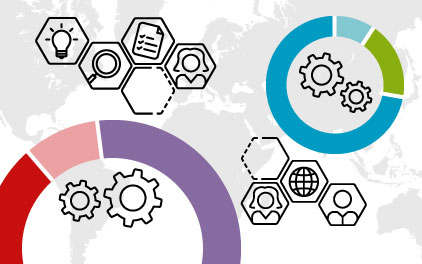

- GOVERNANCE AND DEMOCRACY
- ECONOMIC DEVELOPMENT AND EMPLOYMENT
- ENVIRONMENT AND CLIMATE CHANGE
- RURAL DEVELOPMENT
- PEACE AND SECURITY
Senegal
GIZ local staff
National employees: 309
International employees: 50
Development workers: 5
Integrated specialsts: 1
(as at: 31.12.2024)
The Deutsche Gesellschaft für Internationale Zusammenarbeit (GIZ) GmbH has been working in Senegal since 1977. It opened its office in the capital, Dakar, in 1989.
The national development strategy is intended to make Senegal economically independent over the long term and to transform it into an upper-middle income country by 2050. However, various global crises as well as the unstable security situation in the sub-region and domestic political tensions prior to the last presidential elections have severely impaired Senegal's economic prospects. Limited financial reserves, a fragile health system and an economy that is largely not under state control present the government with major challenges.
Roughly half the population are under 20 years of age and have few opportunities to receive high-quality education or gain a foothold in the labour market. In order to promote sustainable investment and jobs for young Senegalese citizens, the government wants to strengthen its institutions and improve accountability, social justice and the digitalisation of administration.
Moreover, demand for electricity in Senegal is rising – yet only 55 per cent of households and businesses in rural areas have access to electricity. At the same time, adaptation to climate change is crucial to the future development of the country, which is increasingly suffering from droughts and flooding, for example.
GIZ is working across the country on behalf of the German Federal Ministry for Economic Cooperation and Development (BMZ) in the following priority areas:
1. Good governance
2. Economic development, vocational training and employment
3. Climate and energy
GIZ advises its public partners in Senegal on establishing effective institutions and building confidence in those institutions. In particular, the measures promote modern public administration and land tenure for the rural population. GIZ also advises ministries on digital change and inclusive digital services, especially for women.
In the interests of stable economic development, GIZ is working to reduce unemployment and create better-paid jobs. With this in mind it is improving the quality and range of vocational training and is supporting young people setting up small businesses. It also supports the private sector by providing advisory services, financing and training courses for businesses and individuals. In addition, GIZ is working with Senegal on specifically expanding the pharmaceutical industry to produce vaccines and medicines.
Since 2023 Germany has been supporting Senegal in implementing the Just Energy Transition Partnership (JETP). As part of this, GIZ is working to make electricity supplies in Senegal reliable and climate-friendly in order to reduce carbon emissions through energy efficiency and the use of renewable energy. To achieve this it is supporting training and employment in the renewable energy sector. In rural areas, GIZ is facilitating access to electricity through the installation of village grids or individual solar home systems.






